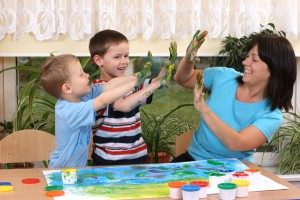 Children learn and develop through activities other than play, they learn and develop more effectively through activities that are playing. Play is beneficial as it is children’s natural way of learning and exploration. Play is a complex set of different behaviours that would be more productive concerning understanding its contribution to development. In general, however, there was a consensus that all types of play can be beneficial, and Howard argued that children need the opportunity to experience a variety of activities that will develop their full repertoire of play skills. The role of adults in children’s play is a complex and under-researched area and so, not surprisingly, several slightly different views were expressed by our European experts. The full potential of play can only be unlocked by active teachers or parents. Some people are of the view that children’s play doesn’t need adult supervision. Adults must make arrangements for materials, safe spaces and toys to encourage children’s play without interfering. This need not be the same in all places and depends on the situation in their own country rather than in substance. In some places even with a lot of free places schools and teachers tend not to involve themselves or participate in children’s play. Thus more adult involvement and more structure would be beneficial for children. On the other hand, in some places, children’s play opportunities are often more structured, and so free play helps children make their own decisions. There is value in a variety of play situations, and so there must be a balanced diet of free, child-initiated play, the play between children and adults, and so on. This predominant view concerning a balance between adult-child play and adult-free play manifested itself most clearly in a consensus around the view that an adult who pays attention, listens to the child and talks to them, will be more beneficial than an adult who structures and directs the child’s activity. Certainly, some evidence suggests that, if an adult organizes the play, children are more interested in capturing the adults’ attention and are less motivated to participate with their peers in shared activities.
Children learn and develop through activities other than play, they learn and develop more effectively through activities that are playing. Play is beneficial as it is children’s natural way of learning and exploration. Play is a complex set of different behaviours that would be more productive concerning understanding its contribution to development. In general, however, there was a consensus that all types of play can be beneficial, and Howard argued that children need the opportunity to experience a variety of activities that will develop their full repertoire of play skills. The role of adults in children’s play is a complex and under-researched area and so, not surprisingly, several slightly different views were expressed by our European experts. The full potential of play can only be unlocked by active teachers or parents. Some people are of the view that children’s play doesn’t need adult supervision. Adults must make arrangements for materials, safe spaces and toys to encourage children’s play without interfering. This need not be the same in all places and depends on the situation in their own country rather than in substance. In some places even with a lot of free places schools and teachers tend not to involve themselves or participate in children’s play. Thus more adult involvement and more structure would be beneficial for children. On the other hand, in some places, children’s play opportunities are often more structured, and so free play helps children make their own decisions. There is value in a variety of play situations, and so there must be a balanced diet of free, child-initiated play, the play between children and adults, and so on. This predominant view concerning a balance between adult-child play and adult-free play manifested itself most clearly in a consensus around the view that an adult who pays attention, listens to the child and talks to them, will be more beneficial than an adult who structures and directs the child’s activity. Certainly, some evidence suggests that, if an adult organizes the play, children are more interested in capturing the adults’ attention and are less motivated to participate with their peers in shared activities.
+91 75111 22218 / +91 75111 22217
